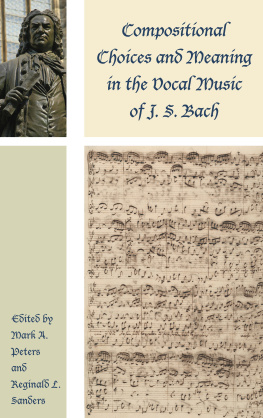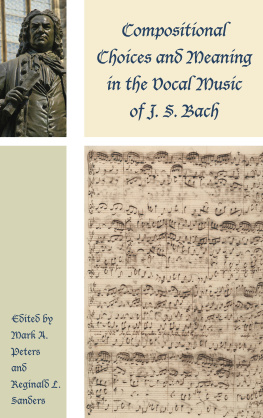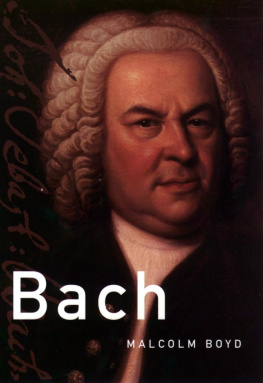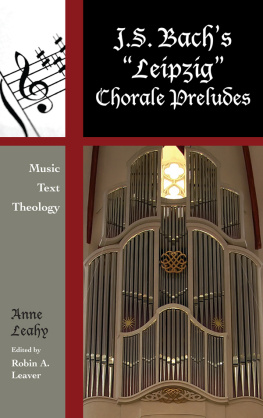Compositional Choices and Meaning in the Vocal Music of J. S. Bach
Contextual Bach Studies
Series Editor:
Robin A. Leaver
Westminster Choir College, emeritus
The music of Johann Sebastian Bach has been the object of intensive study and analysis, but in the past many of these studies have been somewhat narrow in focus. The received view of Bachs music was to some degree incomplete because it was largely discussed on its own terms without being fully set within the contextual perspective of the musicians predecessors, contemporaries, and successors. It is only in fairly recent times that the music of these other composers has become accessible, allowing us to appreciate the nature and stature of their accomplishments, and at the same time giving us new perspectives from which to view a more rounded picture of Bachs genius.
The monographs in this series explore such contextual areas. Since much of Bachs music was composed for Lutheran worship, a primary concern of these monographs is the liturgical and theological contexts of the music. But Bachs music was not exclusively confined to these specific religious concerns. German culture of the time had more general religious dimensions that permeated secular society. Therefore, in addition to specific studies of the liturgical and theological contexts of Bachs music, this series also includes explorations of social, political, and cultural religious contexts in which his music was composed and first heard.
Titles in the Series
Peters, Mark A., and Reginald L. Sanders. Compositional Choices and Meaning in the Vocal Music of J. S. Bach , 2018.
Bartel, Dietrich. Andreas Werckmeisters Muscalische Paradoxal-Discourse: A Well-Tempered Universe , 2017.
Paczkowski, Syzmon. Polish Style in the Music of Johann Sebastian Bach , 2017.
Irwin, Joyce. Foretastes of Heaven in Lutheran Church Music Tradition: Johann Mattheson and Christoph Raupach on Music in Time and Eternity , 2015.
Goncz, Zoltan, translated by Peter Laki. Bachs Testament: On the Philosophical and Theological Background of the Art of Fugue , 2013.
Leahy, Anne, edited by Robin A. Leaver. J. S. Bachs Leipzig Chorale Preludes: Music, Text, Theology , 2011.
van Elferen, Isabella. Mystical Love in the German Baroque: Theology, Poetry, Music , 2009.
Cameron, Jasmin Melissa. The Crucifixion in Music: An Analytical Survey of Settings of the Crucifixus between 1680 and 1800 , 2006.
Compositional Choices and Meaning in the Vocal Music of J. S. Bach
Edited by Mark A. Peters and Reginald L. Sanders
LEXINGTON BOOKS
Lanham Boulder New York London
Published by Lexington Books
An imprint of The Rowman & Littlefield Publishing Group, Inc.
4501 Forbes Boulevard, Suite 200, Lanham, Maryland 20706
www.rowman.com
Unit A, Whitacre Mews, 26-34 Stannary Street, London SE11 4AB
Copyright 2018 The Rowman & Littlefield Publishing Group, Inc.
All rights reserved . No part of this book may be reproduced in any form or by any electronic or mechanical means, including information storage and retrieval systems, without written permission from the publisher, except by a reviewer who may quote passages in a review.
British Library Cataloguing in Publication Information Available
Library of Congress Cataloging-in-Publication Data Available
ISBN 978-1-4985-5495-4 (cloth : alk. paper)
ISBN 978-1-4985-5496-1 (electronic)
 The paper used in this publication meets the minimum requirements of American National Standard for Information SciencesPermanence of Paper for Printed Library Materials, ANSI/NISO Z39.48-1992.
The paper used in this publication meets the minimum requirements of American National Standard for Information SciencesPermanence of Paper for Printed Library Materials, ANSI/NISO Z39.48-1992.
Printed in the United States of America
For our friend and colleague
Don O. Franklin
Professor emeritus, University of Pittsburgh
Past-president, American Bach Society
Foreword
In the past, each of the volumes published in this series has been a monograph by an individual author. This volume is different, being comprised of contributions by various authors. It is also different in that the Contextual Bach Studies explored here are focused on Bach studies in the context of America. Together these essays celebrate Don O. Franklin, who for most of the past half-century has been a prominent leader in American Bach studiesin public by his teaching, writing, and performing, and in private by his encouragement, guidance, and insightall of it communicated with skill, knowledge, experience, and grace.
In large measure, Don Franklin has played a major part in shaping the network of interest in the music of Johann Sebastian Bach here in America. He was in at the beginning of the creation of the American Chapter of the Neue Bachgesellschaft in the mid-1970s, and then in 1988 was part of the small group that was responsible for the transformation of the American Chapter of the NBG into the American Bach Society as an independent, non-profit organization. He served on the first advisory board of the ABS and became its second president. Therefore, it should not come as a surprise that no fewer than four of the authors in this volume have followed Don Franklin by serving as successive presidents of the ABS, and that other authors have also served as officers of the society.
All the contributors to this volume have many reasons to be grateful to Don Franklin. It is a sincere thank-offering from some of the many doctoral students, academic colleagues, co-workers, and friends whose lives and careers have been enlightened by his influence.
Robin A. Leaver
Series Editor
Preface
Yes, it is beautiful, but what does it mean ?
Perhaps one of the most significant results of developments in musicology over the past four decades has been the realization of the importance of musical meaning, whether textual or contextual. As scholars of music, we clearly recognize that it is not sufficient only to describe a piece of music or to analyze its compositional features or even its sources.
While analysis and source study continue to serve as important tools and approaches within historical musicology, it is through newer approachessocial and cultural histories, race and gender studies, studies of performance practice and reception, cross-disciplinary dialogues, to name just a fewthat the question of meaning has become so integral to the discipline. The wonderfully expanded musicological realm demands that we search for meanings, for causes, for the significance of a piece of music both as an artwork and as an act of human communication, a conveyor of meaning. We are compelled to ask questions such as: What does it mean that we as humans make music? What does music making mean within a cultural context? A social context? An individual context? What does a piece of music mean for its patron? For its composer? For its performers? For its hearers? For later composers? For later generations of listeners?
Analysis should address these issues in the context of larger patterns of music compositionwhether by the composer, by her predecessors, by her contemporaries, by later composers, or a combination thereof. And while source study may be motivated simply by the desire for the best critical edition of a work, we may also seek to find meaning from such sources for compositional method, analytical details of the work, or performance implications.
For individual composers, we seek meaning in how they related to their culture, to their social context, to their race and ethnicity, to their gender, to other composers (including predecessors, contemporaries, and successors), to their own works, to performers, to patrons, to audiences. We seek further meaning also by displacing the composer from musicologys pedestal: what does music in a particular time and place mean from the perspective of an audience? A publisher? A philosopher? A poet? An entrepreneur? What were the dominant systems of thought and practice within which the music was originally created and received? From this far from exhaustive list, we believe it is clear that the search for meaning may be seen as one of the underlying themes in musicology today.
Next page











 The paper used in this publication meets the minimum requirements of American National Standard for Information SciencesPermanence of Paper for Printed Library Materials, ANSI/NISO Z39.48-1992.
The paper used in this publication meets the minimum requirements of American National Standard for Information SciencesPermanence of Paper for Printed Library Materials, ANSI/NISO Z39.48-1992.